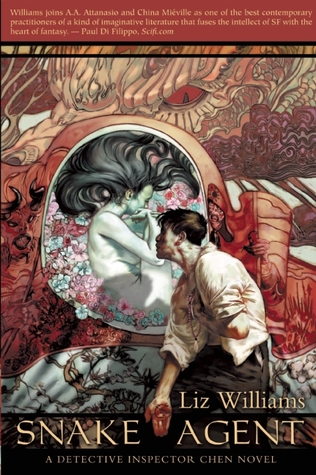 Elizabeth Vail penned this review.
Elizabeth Vail penned this review.
Liz Williams’ Snake Agent, like any good detective novel, all starts with a dame. Detective Investigator Chen, a paranormal investigator for the futuristic South China city of Singapore Three, is visited by a wealthy society wife whose recently-deceased daughter, Pearl Tang, has not arrived in Heaven as scheduled. Naturally, Chen’s investigation turns up more than a simple missing ghost story — a quick probing determines that Pearl’s industrialist father, who may very well have murdered her himself, has disturbing contacts with a powerful Ministry in the bureaucracy of Hell. Virtuous spirits bound for Heaven are being kidnapped to provide brothels in Hell with unique attractions — but the implications could be even more sinister. On top of that, Chen discovers that a demon investigator from Hell’s precinct, Seneschal Zhu Irzh, has also been assigned to Pearl Tang’s case by his superiors, and possibly with a very different agenda in mind.
Thus begins the first novel in Liz Williams’ Detective Inspector Chen series, a novel that blends Barry Hughart’s humorous take on Chinese mythology (Bridge of Birds) and the dark detective stylings of film noir with a bleak science fictional setting worthy of William Gibson or Ian MacDonald. Chen, with his unique position as a supernatural detective, has access to three worlds — the polluted, technology-dependent franchise city Singapore Three, the chaotic yet traditional confines of Hell, and the ritualistic society of Heaven (by way of his long-suffering patron deity, Kuan Yin). According to Williams’ cheeky worldbuilding, all three worlds are organized by bureaucracies and red tape (a recently deceased person, for example, needs to apply for an immigration visa to enter the afterlife). Thus, each world is riddled with loopholes that less scrupulous individuals are willing to exploit, with disastrous consequences.
Williams manages this genre mish-mash of fantasy, science fiction, and mystery with whip-smart pacing; the novel is meticulously divided into short, vivid chapters that keep the story from lagging underneath the weight of its detail. The fantastic element is consistently maintained and entertainingly applied to the investigative aspects of the story, as well as the setting and character: it influences everything from how Chen requests information from Celestial authorities (red paper and a lighter are required) to his means of personal defence (the standard handgun is replaced by a Buddhist rosary).
The story, for all of its splendid detail and rampant black humour, would be nothing without its spot-on characters. Detective Inspector Chen is a man worn almost as thin as the lines he must tread daily in his job and his personal life. He is avoided by his peers, who view his supernatural job with suspicion; he has to maintain contacts with both Heaven and Hell; he must remain discreet about his illegal marriage to a demon; and on top of all that he has to satisfy his increasingly disapproving patron goddess Kuan Yin. Seneschal Zuh Irzh, on the other hand, is a delightfully humorous counterpart to Chen’s stolidity. The demon is a detective from Hell’s Vice Division (regulation and promotion!); he is as dedicated as Chen to maintaining a particular order, but for entirely different reasons.
Snake Agent is a swift but thoroughly original and satisfying read, and lays a solid framework for future novels in the series.
(Night Shade Books, 2005)
